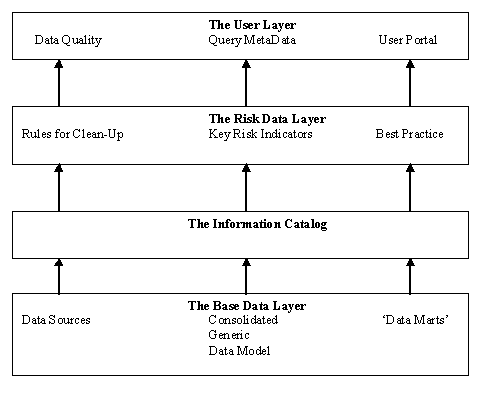 |
This Page contains the Abstract of the Paper.
BULLET POINTS :-
� New Requirements for Global Risk Management by Banks and Financial Institutions.
� Closer User Involvement with an Open-Ended Information Catalog.
� Increased need for Data Integration and a Risk Data Layer.
� Need for Key Risk Indicators and a Publish-and-Subscribe Facility.
� Comparisons of Best-of-Breed and Single-Vendor Solutions
Barry Williams
Principal Consultant
Database Answers Ltd.
London, England.
www.databaseanswers.com
ABSTRACT OF THE PROPOSED PAPER :-
1. INTRODUCTION
Global terrorism has led to new demands on reporting Financial Transactions which affect every Bank in the world.
These new demands are referred to as �the Basel Accord�.
The Basel Accord has resulted in significant new challenges for Enterprise Data Management.
2. INCREASED IMPORTANCE OF THE USERS
The Users are typically Risk Managers. They define and monitor Key Risk Indicators.
They take responsibility for all Risk Management Reports.
A Publish-and-Subscribe mechanism notifies them if any Risk Indicators exceed their safety Threshold.
Users need to be able to audit the Meta Data, which now includes Risk Indicators and how the Indicators are derived.
A bottom-up Rapid Development Approach has been adopted for the Case Study, requiring minimum upfront outlay.
3. IMPLICATIONS OF THE BASEL ACCORD
3.1 Aspects which are not new
These include :-
3.1.1 Data Integration
3.1.2 Enterprise Meta Data
3.1.3 Data Modeling
3.2 Aspects which are new, or more important
These include :-
3.2.1 Very high User involvement
3.2.2 An open-ended and user-extensible Information Catalog.
3.2.3 Auditable Data Rules to be signed off by the Users.
3.2.4 Key Risk Indicators
4. COMPARISON OF BEST-OF-BREED AND SINGLE-VENDOR SOLUTIONS
A review will be included of how Vendors have responded to the challenge.
5. THE DATA ARCHITECTURE

|

